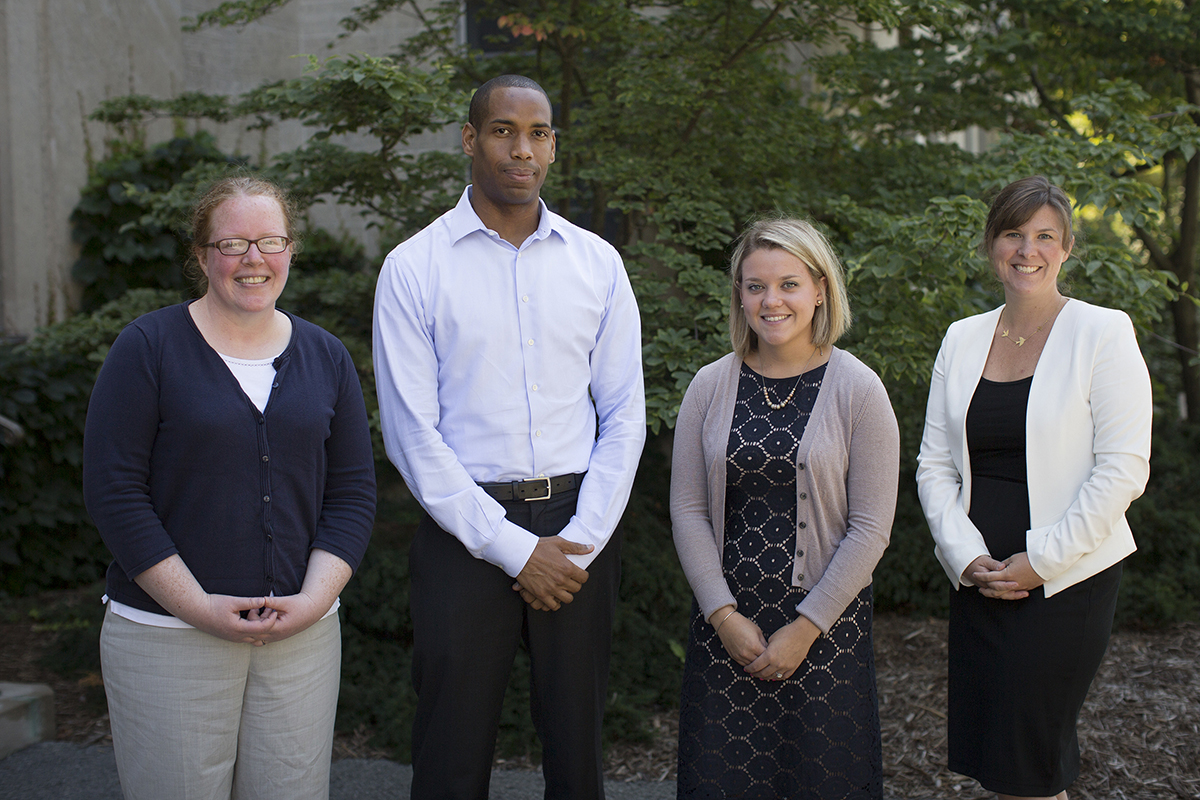University creates office dedicated to Title IX concerns
By Nancy Doolittle

This past spring, Cornell created an Office of the Title IX Coordinator dedicated solely to Title IX concerns, furthering the university’s long-standing commitment to promoting a safe and nondiscriminatory environment for all members of the Cornell community, in which incidents of sexual misconduct have no place. These incidents include any occurrence of gender-based harassment, sexual harassment, sexual assault, domestic and dating violence, stalking, sexual exploitation or other forms of sexual misconduct committed by or against students, staff or faculty.
Sarah Affel, then lead Title IX investigator, was appointed to head the new office.
As Title IX coordinator, Affel oversees the university’s response to and investigation of complaints against students accused of sexual misconduct. Her office, in 150 Day Hall, also includes two Title IX investigators, Elizabeth McGrath and Kareem Peat, and a case coordinator, Jessica Reynolds.
The Title IX coordinator oversees the university’s compliance with Title IX, New York State Education Law Article 129-B, and related federal and state laws and regulations; its ongoing education and primary prevention efforts; its investigation, response and resolution of all reports of sexual and related misconduct under university Policy 6.4; and its efforts to eliminate sexual misconduct, prevent its recurrence and remedy its effects. Enacted in 1972, Title IX is a landmark federal civil rights law that prohibits sex discrimination in education; 129-B addresses college and university sexual assault, dating violence, domestic violence and stalking prevention and response policies and procedures.
The office is a primary resource and point of entry for anyone who has experienced or observed such behaviors.
Affel, who holds a law degree from the Northeastern University School of Law and was admitted to the Massachusetts and New York bars, said she guides her office by civil rights principles that seek to respect all individuals.
“When someone comes to or is referred to my office to report student sexual misconduct, the first thing I am concerned about is that person’s well-being and safety, and we will see if any accommodations or protective measures are needed, such as changing class schedules or living arrangements,” Affel said. “We support, protect the safety of, and provide equitable processes for the person reporting the incident (the complainant) as well as the student accused of sexual misconduct (the respondent), and seek always to maintain a safe and inclusive living, learning and working environment,” she said.
Affel is committed to safeguarding the privacy of all parties. “Any member of the staff or faculty to whom a student reports sexual misconduct will keep the report private to the greatest extent possible, sharing the information only as necessary with the Title IX coordinator so that I can provide the student with resources and information about their rights and options,” she said, adding, “The university strongly supports a complainant’s request for confidentiality and, unless there is risk of harm that cannot be mitigated, will honor a complainant’s decision not to pursue a formal complaint under our procedures. If a formal complaint is pursued, all participants are instructed that it is confidential.”
Once the complainant’s safety is addressed, the complainant can opt to proceed with a formal complaint, which will be followed by an investigation and factual report by a trained lead Title IX investigator. The procedures following this investigation were revised Aug. 1 to include, among other changes, a hearing by a three-person panel of faculty and staff. The parties have the opportunity to testify in front of the panel and request witnesses. The hearing panel conducts all questioning and, ultimately, will decide whether a student has violated the university’s policy. The complainant and respondent, along with any advisors and support persons, will always be in separate rooms.
“These procedures allow us to gather relevant information for review, minimize the potential to inflict additional trauma on those involved in the investigation, and respect the rights of both parties,” Affel said.
The Title IX office compiles the initial reports of sexual misconduct and tracks and monitors formal complaints to resolution. The office also aggregates statistics from these reports and complaints to assess the effectiveness of the university’s policies and procedures.
In addition, Affel’s office oversees education and outreach on matters related to Title IX, working closely with community partners such as Gannett Health Services and Residential and New Student Programs. “Cornell already has a strong foundation of training for students, staff and faculty available, in person and online,” Affel said, noting the program for faculty and staff, “Building a Culture of Respect,” and many resources available through the SHARE website.
For more information or to report an incident, call the office at 607-255-2242 or email titleix@cornell.edu, or go to titleix.cornell.edu.
Media Contact
Get Cornell news delivered right to your inbox.
Subscribe